(完整)初中英语现在完成时详解
(完整)初中英语现在完成时详解.doc

在完成一、在完成构成构成:在完成由助have + 去分构成,助have 有人称和数的化。
第三人称数用has,其余用have.在完成的否定式直接在助后面加上not、疑式是把助提到主之前。
以study 例,其否定式、疑式和回答形式如下:否定式疑式I have not (haven ’ t) studied ⋯. Have I studied ⋯?You have not (haven ’ t) studied ⋯. Have you studied ⋯?He has not (hasn ’ t) studied ⋯. Has he studied ⋯?否定疑式回答(肯定 /否定)Have I not (Haven ’ t I) studied ⋯? Yes, you have. No, you haven ’ t.Have you not (Haven ’ t you) studied ⋯?Yes, I have. No, I haven ’ t.Has he not (Hasn ’ t he) studied ⋯? Yes, he has. No, he hasn’ t.二、在完成用法1、在完成通常表示在之前已完成的作或存在的状。
人的是作或状在的果或影响。
My daughter has just gone out.我女儿出去。
I ’ m sure we’ ve met before我肯.定我以前面。
She has arrived. 她到了。
2、表示持到在的作或状,往往和包括在在内的表示一段的状用,如recently, already, just, lately, for⋯, sinceyt等⋯,。
如:I haven’ t heard from her these days.些日子我没有收到她的信。
We haven ’ t seen you recently.最近我没有到你。
They have been away for two years.他离开已两年了。
(完整版)现在完成时讲解
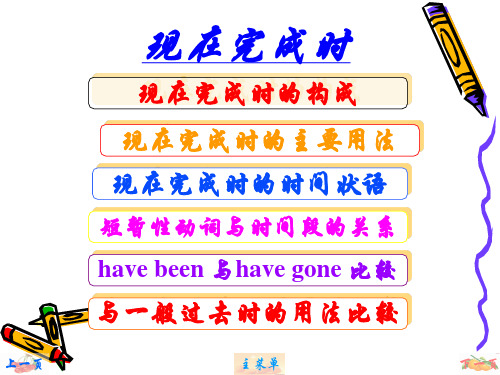
I have had this watch for five years / since 5 years ago.
2.这位老人已经死了十年了。
WThe old man has died for ten years.
The old man has been dead for ten years/since 10 years ago.
I have learnt English for more than ten years.我已经学了10多年的英语。
(从10年前开始,持续到现在还在学)
上一页
She has swum since half an hour ago. 我已经游泳了半个小时
(半个小时前已经开始游泳,到现在还在游)
主菜单
于助动词或系动词后,实义动词前。 • never用于句中,助动词或系动词后,实
义动词前,表示否定意义。
• He has ever been to Paris.
• He has never been to Paris.
3) just表示“刚刚”(用于完成时态时,与already, never 等副词的位置一样,多用在助动词have/has和 动词过去分词之间)
He has been here for three days.
He has been here since yesterday.
He has been here since two days ago / last Monday.
He has been here since his wife died.
Since he was a child ,he has lived in England.
2024年中考英语语法复习+—现在完成时课件

Have you seen the doctor? 你看过医生了吗?
在现在完成时中,当主语是I/you/we/they时,助动词用 have;当主语是第三人称单数时,助动词用has。
三、现在完成时的使用
1.表示过去发生并结束的动作对现在所产生的影响
He has left the city. 他已离开了这个城市。(结果:他不在这个城市。)
一、基本构成:have/has+done
I have finished my homework. 我已完成了作业。 (这里的finished就是动词finish的 过去分词。)
二、现在完成时不同人称的用法 I have washed my car.我洗过车子了。
We have done the whole work.我们干完了所有活儿。
A.practised
B.were practising C.have been practising
C
3 . —Where is mother?
—She is in the kitchen. She ________ the
housework all morning.
A.is doing
B.was doing
B.was studying
C.studied
D.have been studying
D
15 . “I _____ as everyone expects ”, Yao Ming
said .
A.haven’t played
B.haven’t been playing
C.didn’t play
D.am not playing
现在完成时的用法详解英语

• Is your father in ?
•
No, heha__s_g__o_n__e__t_o___ to Shenzhen.
•
H__a__s___he everb_e_e__n__ there before ?
•
Yes, heh_a_s__b_e__e_n_____ there several times
ago.
A. Did…copy…did
B. Have…copied…have
C. Have…copied…did D. Did …copy…had
5. “Why _A_____ she _______ angry ?”
“Because he _____ at her just now .”
A. did…get…shouted B. has…got…shouted
A. Have…gone to B. Have…gone in
C. Have…been to D. Have …been in
3. My brother _C___college for over three years.
A. has gone to B. has been to C. has been at
但是不能和表示一段时间的状语连用。
短暂性动词变延续性动词:
• join --- be in / a
2) comeb-e-- in / at
• 3) borrow ---keep 4) buy -h-a-ve
5) arrive ---be
6) leave b--e- away (from)
7) begin --b- e on
• It has been colds_in__c_e__ two weeks ago.
初中英语现在完成时详解
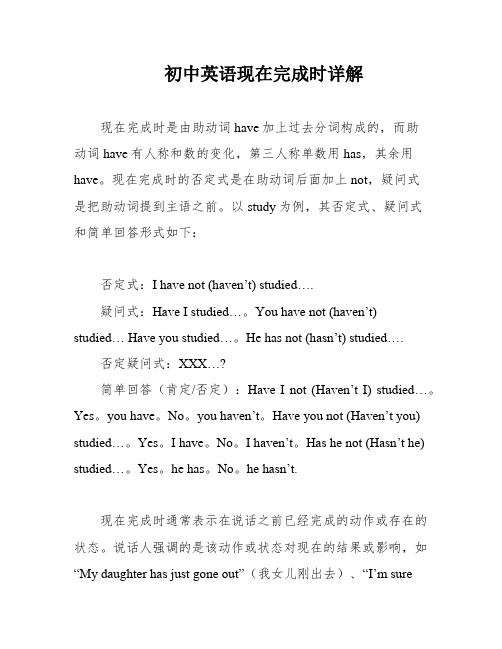
初中英语现在完成时详解现在完成时是由助动词have加上过去分词构成的,而助动词have有人称和数的变化,第三人称单数用has,其余用have。
现在完成时的否定式是在助动词后面加上not,疑问式是把助动词提到主语之前。
以study为例,其否定式、疑问式和简单回答形式如下:否定式:I have not (haven’t) studied….疑问式:Have I studied…。
You have not (haven’t) studied… Have you studied…。
He has not (hasn’t) studied….否定疑问式:XXX…?简单回答(肯定/否定):Have I not (Haven’t I) studied…。
Yes。
you have。
No。
you haven’t。
Have you not (Haven’t you) studied…。
Yes。
I have。
No。
I haven’t。
Has he not (Hasn’t he) studied…。
Yes。
he has。
No。
he hasn’t.现在完成时通常表示在说话之前已经完成的动作或存在的状态。
说话人强调的是该动作或状态对现在的结果或影响,如“My daughter has just gone out”(我女儿刚出去)、“I’m surewe’ve met before”(我肯定我们以前见过面)和“She has arrived”(她到了)等。
此外,现在完成时还可以表示持续到现在的动作或状态,往往和包括现在在内的表示一段时间的状语连用,如recently、already、just、lately、for…、since…、yet等。
例如,“I haven’t heard from her these days”(这些日子我没有收到她的信)和“XXX”(最近我们没有见到你)等。
还有一些表示时间的短语也可以和现在完成时连用,如:①for+时段②since+过去一个时间点(译为:自从……以来)③since+时段+ago④since+从句(过去时)Mary has been ill for three days。
初中现在完成时讲解ppt

since
for
since
for
since
练习题: 1.It's a long time since we ____ (meet) last, isn't it? 2.--I know you ___________ (choose) a picture book among these. --Yes,Have a look at it, please. 3.So far, spaceships without people ___________ (reach) the moon and some other parts of the universe. 4.My father____ home for nearly three weeks. A.has gone away from B.has left C.has been away from D.went away 5.Mr. and Mrs. Green have_____in China for a week. A.been B.got C.arrived D.reached
eg.--- I’ve lived here for 15 years. eg.--- I’ve lived here since 15 years ago(1990)
选用for和since填空: 1.We haven’t seen each other ______ a long time. 2.His father has been in the factory ______ 10 years ago. 3.The film has been on ______ 20 minutes. 4.Mr Green has worked here ______ he came to China. 5.His grandparents have been dead ______ several years. 6. It’s five years _______ we met last time
(word完整版)初中英语语法-现在完成时讲解以及练习题讲义

(word完整版)初中英语语法-现在完成时讲解以及练习题讲义现在完成时1.构成现在完成时是由助动词have(has)+动词的过去分词构成。
助动词have(has)表明事情发生于现在。
它和主语的人称、数要保持一致。
过去分词在句子中做谓语,说明句子的含义。
2.用法(1)动作发生在过去某个不确定的时间,但对现在有某种影响和结果。
常被just、already、yet 等副词修饰。
如:-Have you had lunch yet? -Yes,I have. I've just had it.你(已经)吃午饭了吗?我刚刚吃过。
(现在我不饿了)(2)表示从过去某一时刻开始一直持续到现在的动作或状态。
这个动作可能刚停止,可能仍然在进行。
常带有for和since等表示一段时间的状语。
如:He has taught here since 1981他自1981年就在这儿教书。
(可能还要继续教)I have't seen her for four years.我有四年没见到她了。
(3)表示说话前发生过一次或多次的动作,现在成为一种经验,一般译为汉语“过”,常带有twice,ever,never,three times等时间状语。
如:I have been to Beijing twice.我去过北京二次。
3.现在完成时的时间状语(1)现在完成时属于现在时范围,故不能和过去的时间状语连用。
如:yesterday,last Sunday,in1990,three years ago等。
但是,在强调动作产生的后果和影响时,可以和一些表示不确定的时间状语连用。
a. 用副词already和yet。
already一般用于肯定句中,yet一般用于否定句和疑问句中。
如:We have already finished our homework.我们已完成作业了。
They haven't finished their homework yet.他们还没有完成作业。
(完整版)现在完成时讲解(含讲解及习题)(可编辑修改word版)
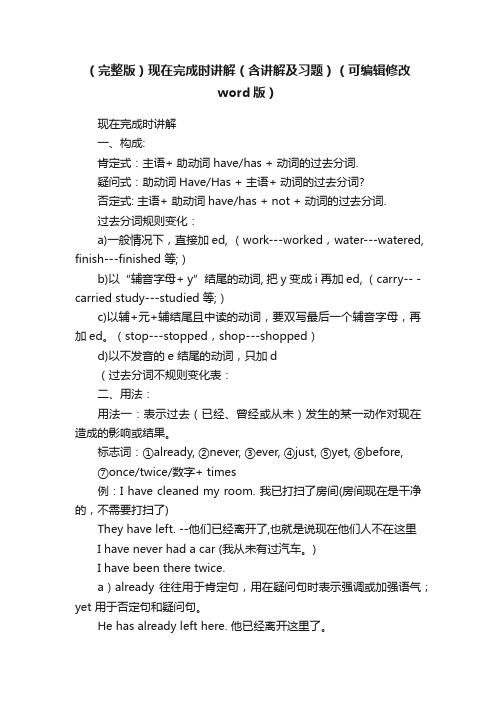
(完整版)现在完成时讲解(含讲解及习题)(可编辑修改word版)现在完成时讲解一、构成:肯定式:主语+ 助动词have/has + 动词的过去分词.疑问式:助动词Have/Has + 主语+ 动词的过去分词?否定式: 主语+ 助动词have/has + not + 动词的过去分词.过去分词规则变化:a)一般情况下,直接加ed, (work---worked,water---watered, finish---finished 等;)b)以“辅音字母+ y”结尾的动词, 把y 变成i 再加ed, (carry-- -carried study---studied 等;)c)以辅+元+辅结尾且中读的动词,要双写最后一个辅音字母,再加ed。
(stop---stopped,shop---shopped)d)以不发音的e 结尾的动词,只加d(过去分词不规则变化表:二、用法:用法一:表示过去(已经、曾经或从未)发生的某一动作对现在造成的影响或结果。
标志词:①already, ②never, ③ever, ④just, ⑤yet, ⑥before,⑦once/twice/数字+ times例:I have cleaned my room. 我已打扫了房间(房间现在是干净的,不需要打扫了)They have left. --他们已经离开了,也就是说现在他们人不在这里I have never had a car (我从未有过汽车。
)I have been there twice.a)already 往往用于肯定句,用在疑问句时表示强调或加强语气;yet 用于否定句和疑问句。
He has already left here. 他已经离开这里了。
Has he already left here? 他(真的)已经离开这里了吗?(表示加强语气)My teachers haven’t had breakfast yet. 我的老师们还没有吃早饭。
初中英语现在完成时讲解全(共24张PPT)

I studied English ten years ago.
(come来到某地….
left the team
has been on C.
表示动作发生在过去,对现在造成的影响。
)
be over
went to bed
填空使用for和since
Tom ___for several hours.
表示动作发生在过去,对现在造成的影响。
• She has lived here ______1996.
• 2 标准词:so far/up to now (到目前为止) ;lately/recently(最近)
• Up to now/So far ,I haven’t been successful.
• Lately/Recently,I haven’t seen my teacher.
3. He bought the motorbike a month ago.
---He ____ ____ the motorbike for a month. 4. He arrived here three days ago.
--- He ____ ____ here since three days ago. 5. They turned off the light 2 hours ago.
(finish结束....)
be over
1.我买这本书三年了。Buy I have bought the book.
(1) I have had the book for 3 years. (2) I have had the book since 3 years ago.
了borrow He has borrow the book. (1)He has kept the book for 2 months . (2) He has kept the book since 2 months ago.
初中英语现在完成时解析

—Why is Mr. Yang still in the teachers’ office?
—Maybe he ___B_____ his work yet. A. doesn’t finish B. hasn’t finished C. haven’t finished
( C )【2013广西贵港】 —Do you know the movie Lost in Thailand? —Yes. I ______ it twice. It’s funny. A. saw B. see C. have seen D. will see
(是团员的状态可持续)
比较since和for since 用来说明动作起始时间— “自从……”
for用来说明动作延续时间长度— “长达……”
I have lived here for more than twenty years. I have lived here since I was born. My aunt has worked in a company since 1949. I have not heard from my uncle for a long time. 注意:并非有for 作为时间状语的句子都用现在完成时
5. They turned off the light 2 hours ago.
--- The light ____ ____ ____ for 2 hours.
延
1. He died 10 years ago.
续
--- He has been dead for 10 years / since
冬天已经来了,
Winter has already come,
现在完成时知识点详解初中
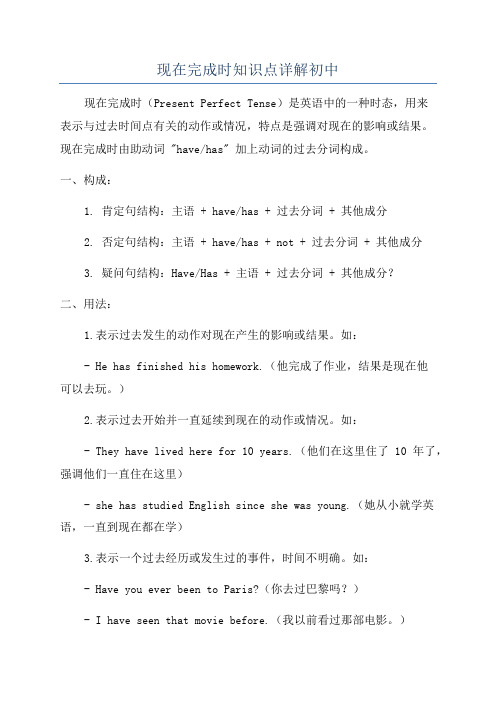
现在完成时知识点详解初中现在完成时(Present Perfect Tense)是英语中的一种时态,用来表示与过去时间点有关的动作或情况,特点是强调对现在的影响或结果。
现在完成时由助动词 "have/has" 加上动词的过去分词构成。
一、构成:1. 肯定句结构:主语 + have/has + 过去分词 + 其他成分2. 否定句结构:主语 + have/has + not + 过去分词 + 其他成分3. 疑问句结构:Have/Has + 主语 + 过去分词 + 其他成分?二、用法:1.表示过去发生的动作对现在产生的影响或结果。
如:- He has finished his homework.(他完成了作业,结果是现在他可以去玩。
)2.表示过去开始并一直延续到现在的动作或情况。
如:- They have lived here for 10 years.(他们在这里住了10年了,强调他们一直住在这里)- she has studied English since she was young.(她从小就学英语,一直到现在都在学)3.表示一个过去经历或发生过的事件,时间不明确。
如:- Have you ever been to Paris?(你去过巴黎吗?)- I have seen that movie before.(我以前看过那部电影。
)4.表示以前曾经做过的经历或动作。
如:- Have you ever tried sushi?(你试过寿司吗?)三、注意事项:1. 标志词:already(已经)、yet(还),常与现在完成时连用。
2.与一般过去时的区别:4. 主要使用have的情况:- 我们一般用have作为第一人称(I、we)和第二人称(you)的助动词,用has作为第三人称(he、she、it)的助动词。
如:- I have seen the movie.- He has read the book.- 固定搭配中使用have:- have breakfast/lunch/dinner(吃早饭/午饭/晚饭)- have a shower/bath(洗澡)- have a look(看一看)- have a rest(休息)。
现在完成时讲解
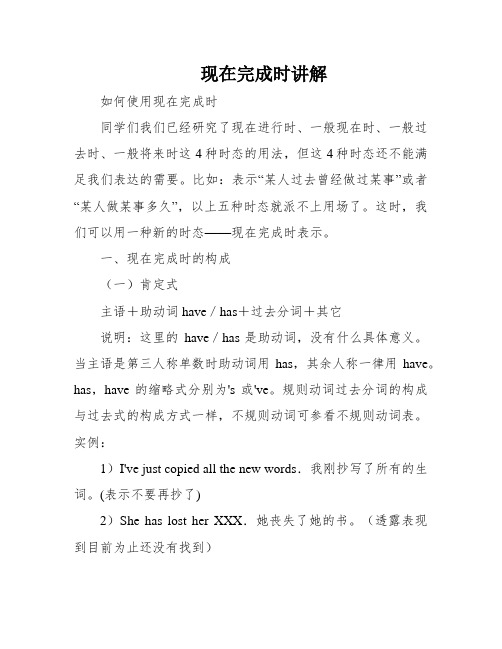
现在完成时讲解如何使用现在完成时同学们我们已经研究了现在进行时、一般现在时、一般过去时、一般将来时这4种时态的用法,但这4种时态还不能满足我们表达的需要。
比如:表示“某人过去曾经做过某事”或者“某人做某事多久”,以上五种时态就派不上用场了。
这时,我们可以用一种新的时态——现在完成时表示。
一、现在完成时的构成(一)肯定式主语+助动词have/has+过去分词+其它说明:这里的have/has是助动词,没有什么具体意义。
当主语是第三人称单数时助动词用has,其余人称一律用have。
has,have的缩略式分别为's或've。
规则动词过去分词的构成与过去式的构成方式一样,不规则动词可参看不规则动词表。
实例:1)I've just copied all the new words.我刚抄写了所有的生词。
(表示不要再抄了)2)She has lost her XXX.她丧失了她的书。
(透露表现到目前为止还没有找到)(如果用过去时:XXX .则强调书是过去丢的这一动作,而不知现在有没有找到)3)We've just cleaned the classroom.我们刚好打扫了教室。
(表明现在教室是干净的)(二)否定式主语+助动词have/has+not+曩昔分词+别的申明:目前完成时组成否认句时,只需在助动词have/has背面加not就行。
have not,has not的缩略式分别为haven't,hasn't。
另外,一定句中有some,already时,改成否按时要分别改成any,yet。
实例:1)I XXX.我还没有完成我的功课。
2)XXX.她没有坐火车旅行过。
3)We have XXX foreigner.我们历来没有和外国人说过话。
注:有时not可以用never代替,表示“从来没有”的意思。
又如:4)I have never seen him before.以前我从来没有见过他。
中考英语语法丨现在完成时详解(附练习题及答案)
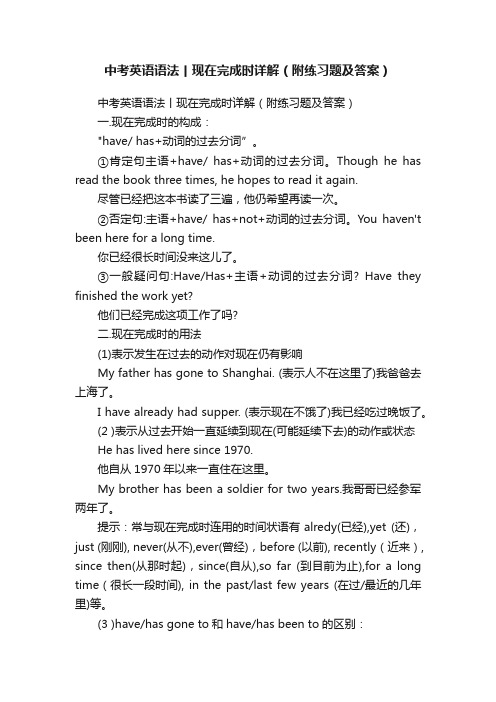
中考英语语法丨现在完成时详解(附练习题及答案)中考英语语法丨现在完成时详解(附练习题及答案)一.现在完成时的构成:"have/ has+动词的过去分词”。
①肯定句主语+have/ has+动词的过去分词。
Though he has read the book three times, he hopes to read it again.尽管已经把这本书读了三遍,他仍希望再读一次。
②否定句:主语+have/ has+not+动词的过去分词。
You haven't been here for a long time.你已经很长时间没来这儿了。
③一般疑问句:Have/Has+主语+动词的过去分词? Have they finished the work yet?他们已经完成这项工作了吗?二.现在完成时的用法(1)表示发生在过去的动作对现在仍有影响My father has gone to Shanghai. (表示人不在这里了)我爸爸去上海了。
I have already had supper. (表示现在不饿了)我已经吃过晚饭了。
(2 )表示从过去开始一直延续到现在(可能延续下去)的动作或状态He has lived here since 1970.他自从1970年以来一直住在这里。
My brother has been a soldier for two years.我哥哥已经参军两年了。
提示:常与现在完成时连用的时间状语有alredy(已经),yet (还),just (刚刚), never(从不),ever(曾经),before (以前), recently(近来), since then(从那时起),since(自从),so far (到目前为止),for a long time(很长一段时间), in the past/last few years (在过/最近的几年里)等。
完整版)现在完成时的用法详解

完整版)现在完成时的用法详解现在完成时是英语中的一种时态,表示动作或状态已经发生,对现在产生影响或有关联。
下面是现在完成时的用法详解:一、构成和用法:现在完成时由助动词“have/has”加上动词的过去分词构成。
下面是不同人称的构成方式:I/we/you/they + have + 过去分词He/she/it + has + 过去分词现在完成时的用法包括以下几个方面:1.表示过去发生的动作对现在产生的影响或结果:I have ___(我已经完成作业了)2.表示过去开始的动作一直延续到现在并可能继续下去:She has lived in New York for five years.(她在纽约已经住了五年了)3.表示经历过的经历或动作:Have you ever been to Paris?(你去过巴黎吗?)4.表示已完成的动作或状态:They have already left.(他们已经走了)二、使用注意事项:使用现在完成时需要注意以下几点:1.不能和过去时间状语连用:He has already left yesterday.(错误)应改为He left yesterday.(正确)2.不能和表示过去具体的时间连用:I have seen her last night.(错误)应改为I saw her last night.(正确)3.可以和表明时间段的时间状语连用:I have lived here for three years.(我在这里住了三年了)4.可以和表示过去到现在一段时间的时间状语连用:I have known him since 2010.(从2010年起我就认识他)以上就是现在完成时的用法详解,希望对你有帮助。
初中英语语法现在完成时专题讲解
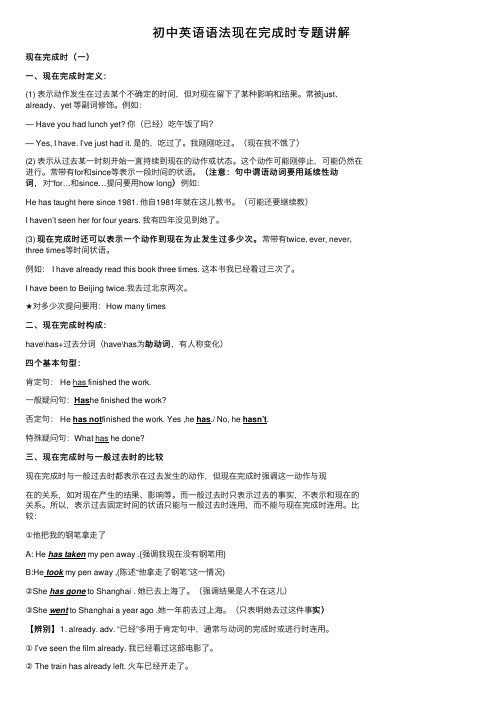
初中英语语法现在完成时专题讲解现在完成时(⼀)⼀、现在完成时定义:(1) 表⽰动作发⽣在过去某个不确定的时间,但对现在留下了某种影响和结果。
常被just、already、yet 等副词修饰。
例如:— Have you had lunch yet? 你(已经)吃午饭了吗?— Yes, I have. I’ve just had it. 是的,吃过了。
我刚刚吃过。
(现在我不饿了)(2) 表⽰从过去某⼀时刻开始⼀直持续到现在的动作或状态。
这个动作可能刚停⽌,可能仍然在(注意:句中谓语动词要⽤延续性动进⾏。
常带有for和since等表⽰⼀段时间的状语。
(注意:句中谓语动词要⽤延续性动词,对“for…和since…提问要⽤how long)例如:词,He has taught here since 1981. 他⾃1981年就在这⼉教书。
(可能还要继续教)I haven’t seen her for four years. 我有四年没见到她了。
现在完成时还可以表⽰⼀个动作到现在为⽌发⽣过多少次。
常带有twice, ever, never, (3) 现在完成时还可以表⽰⼀个动作到现在为⽌发⽣过多少次。
three times等时间状语。
例如: I have already read this book three times. 这本书我已经看过三次了。
I have been to Beijing twice.我去过北京两次。
★对多少次提问要⽤:How many times⼆、现在完成时构成:have\has+过去分词(have\has为助动词助动词,有⼈称变化)四个基本句型:肯定句: He has finished the work.⼀般疑问句:Has he finished the work?否定句: He has not finished the work. Yes ,he has./ No, he hasn’t.特殊疑问句:What has he done?三、现在完成时与⼀般过去时的⽐较现在完成时与⼀般过去时都表⽰在过去发⽣的动作,但现在完成时强调这⼀动作与现在的关系,如对现在产⽣的结果、影响等。
初中英语现在完成时详细讲解

初中英语语法现在完成时详细讲解现在完成时是英语中一种表示过去发生的动作对现在产生的影响或结果的时态。
它由"have/has + 过去分词"构成。
现在完成时的用法如下:
1. 表示过去发生的动作对现在产生的影响或结果:
①I have finished my homework.(我已经完成了我的作业。
)这里表示过去完成的动作是完成作业,现在的结果是作业已经完成。
②They have lived in this city for five years.(他们在这个城市已经生活了五年。
)这里表示过去完成的动作是生活在这个城市,现在的结果是他们已经在这个城市生活了五年。
2. 表示从过去某一时间点开始到现在一直持续的动作:
①She has worked at this company since 2010.(她从2010年起在这家公司工作。
)这里表示过去从2010年开始工作,到现在一直在这家公司工作。
3. 表示过去已经发生但时间未具体提及的动作:
①Have you ever been to Paris?(你去过巴黎吗?)这里表示过去是否有去过巴黎,但并未提及具体时间。
需要注意的是,现在完成时强调的是过去的动作与现在的关系,因此常用于包含现在的句子中。
同时,现在完成时通常与表示一段时间的时间状语连用,如for、since等,以强调动作的持续性或延续性。
另外,现在完成时不能与明确的过去时间状语连用,如yesterday、last week等,因为这些表示过去具体时间点的状语与现在完成时的
概念不符。
在这种情况下,应使用过去时态表示过去发生的动作。
(完整)英语现在完成时

英语现在完成时一.基本结构have(has) + been + done(动词的现在分词)否定句式 have(has) + not + been + done(动词的现在分词)疑问句式have(has)放在句首二.用法1.过去发生的动作对现在有影响I have seen the film ,so I know what the story says.2.过去发生的动作持续到现在(还有可能继续发生)The film has been on for 5 minutes。
三.延续性动词1.现在完成时中应使用延续性动词2.非延续性动词:动作开始既(即)结束3.非延续性动词过渡到延续性动词常见:四.标志1.already ,yet, never ,ever ,just ,before ,once/twice/数字+times(1)already, yetalready:用于肯定句,疑问句中,表示“已经”或表示强调He has already left here。
Has he already left here.yet:用于否定句中,疑问句中,表示“还没”或“已经"My teacher hasn’t had breakfast yet。
Have you written to your parents yet?(2)never ,evernever:从来没有ever:曾经We have never been to the Great wall .Have you ever been to Canada?(3)just刚才I am just had breakfast.2.all the time总是, during the last years在过去的几年里recently最近地=lately, by the end of (this month ,next year) in the past few years/month 在过去的……间up to now直到现在3.for+段时间,since+点时间I have been here for 5 years.I have been here since 2000.I have been here since 5 years ago. since+段时间+agoI have been here since I graduated in 2000 。
初中英语现在完成时态详细讲解及其练习

注意事项
单击此处可添加副标题
have been(to)与 have gone( to)的区别:have been(to)表示“去过某地(现在已经回来了)”,可用于 各人称;have gone(to)表示“去某地了(说话时某人不 在当地)”,常用于第三人称,前者可与 once , never, several times 等连用,后者则不能。
pictures ❖ (A ) has just (B)have ever (C)has yet
(D)have already
❖ 二 选择填空
_ ❖ ( ) 1. ——Have you finished your homework ——Yes, I it last night ❖ (A) finish (B) finished (C) have finished (D) will finish
三 用 since 和 for 填空 (一)
❖ 1) ______ two years _______ two years ago 2) _______ last month 3) _______ yesterday 4) _______ an hour ago 5) ______ she left here 6) _______ 4 o’clock 8) ______ 1999
归纳总结:由非延续性动词到延续性动 词的转换
• arrive→be here die →be dead begin (start)→ be on • come back→ be back fall ill (sick, asleep )→be ill (sick,
asleep) leave →be away get up→ be up finish →be over • open →be open close →be closed borrow →keep • be on →be in 或 be a member of… go to school→be a
现在完成时讲解(完整版)

2) 表示过去发生的动作,强调结果或对现在的影响。
She has taught English since he came here.
for: (长达)
for+ 时间段
He has kept the book for 2 weeks.
用for 或since填空
1. Mr. Brown has had his TV __fo_r___ 15 years. 2. I’ve taken driving lessons __s_in_c_e__last month. 3. My sister has had her cell phone __f_o_r__a month . 4. My friends haven’t visited me __s_in_c_e_few days ago. 5. We haven’t used our car __fo_r__ a long time . 6. She hasn’t had a good cup of coffee __fo_r__years. 7. Tom has worn glasses __s_in_c_e__he was 7 years old.
Someone has broken the window. (窗户现在是坏的) I have already lost the key. (我现在没有钥匙) I haven’t read that book yet . (不了解书的内容) I have just cleaned my hands. (手是干净的)
- 1、下载文档前请自行甄别文档内容的完整性,平台不提供额外的编辑、内容补充、找答案等附加服务。
- 2、"仅部分预览"的文档,不可在线预览部分如存在完整性等问题,可反馈申请退款(可完整预览的文档不适用该条件!)。
- 3、如文档侵犯您的权益,请联系客服反馈,我们会尽快为您处理(人工客服工作时间:9:00-18:30)。
现在完成时一、现在完成时构成构成:现在完成时由助动词have + 过去分词构成,助动词have 有人称和数的变化。
第三人称单数用has,其余用have.现在完成时的否定式直接在助动词后面加上not、疑问式是把助动词提到主语之前。
以study 为例,其否定式、疑问式和简单回答形式如下:1、现在完成时通常表示在说话之前已经完成的动作或存在的状态。
说话人强调的是该动作或状态对现在的结果或影响。
My daughter has just gone out. 我女儿刚出去。
I’m sure we’ve met before. 我肯定我们以前见过面。
She has arrived. 她到了。
2、表示持续到现在的动作或状态,往往和包括现在在内的表示一段时间的状语连用,如recently, already, just, lately, for…, since…,yet等。
如:I haven’t heard from her these days. 这些日子我没有收到她的信。
We haven’t seen you recently. 最近我们没有见到你。
They have been away for two years. 他们离开已经两年了。
She has been with us since Monday.①for+时段②since+过去一个时间点(译为:自从……以来)③since+时段+ago④since+从句(过去时)⑤It is+时段+since+从句(过去时)Mary has been ill for three days.I have lived here since 1998.注意:since和for的区别since后接时间点,如1993,last term, yesterday, the time I got therefor后接一段时间,表示“长达多久”,如ten years, a while, two days等。
3、表示短暂意义的动词如arrive, leave, borrow, buy, begin, start, die等,在完成时当中不能和表示一段时间的状语连用,因为它们表示的动作不可能持续。
因此,不能说:He has come here for 2 weeks. ×The old man has died for 4 months. ×They have left only for 5 minutes. ×4、has gone (to),has been (to), has been (in) 的区别Have/Has gone(to) :去了(现在不在说话现场,可能在路上和已经到)Where is your father?He has gone to Shanghai.Have/Has been (to) :去过(已不在去过的地方)My father has been to Shanghai.Have/has been in:呆了多久(还在所呆的地方)My father has been in Shanghai for two months. /since two months ago.5、现在完成时不能和表示过去的时间状语连用,如yesterday, last year, in 1976, two days ago, just now, when I came in,但可以和already, yet, sometimes, always, often, before, lately, recently, once, twice, ever, never等连用。
不能与when连用。
现在完成时往往同表示不确定的过去时间状语连用例如:She has already come. 她已经来了。
I haven’t read it yet. 我还没读过这个。
I have met him before. 我从前曾见过他。
Ma Hong has always been a good student. 马红一直是个好学生。
I have often seen him in the street. 我经常在街上看见他。
They have never been to Yan’an. 他们从未去过延安。
I haven't seen him lately. 我近来没看到他。
三、现在完成时的标志1、现在完成时的含义之一是过去完成的动作对现在仍有影响,用以下四大标志词可以表达这种含义:* 以already, just和yet为标志He has already got her help.他已得到她的帮助。
He has just seen the film.他刚刚看过这场电影。
He hasn't come back yet.他还没有回来。
* 以ever和never为标志This is the best film I have ever seen.这是我曾经看过的最好的一部电影。
He has never been to Beijing.他从没有到过北京。
* 以动作发生的次数为标志He says he has been to the USA three times. 他说他已经去过美国三次了。
* 以so far(到目前为止)为标+beforeHe has got to Beijing so far.到目前为止他已到了北京。
She has passed the exam so far.到目前为止她已经通过了考试。
2.过去已经开始的动作一直延续到现在, 甚至有可能继续延续下去,我们可以从动作“延续”的特性和“时间”点段的区分入手,进一步学习现在完成时。
①for+时段②since+过去一个时间点(过去从句)为标志四、瞬间动词buy, die, join, come,go ,leave, join ……不能直接与for since 连用。
要改变动词buy----have borrow -----keepcome/arrive/reach/get to-----be ingo out----be out leave ----be awaybegin-----be on finish----be overopen----be open close -----be closeddie----be dead1、have代替buyMy brother has had(不能用has bought) this bike for almost four years.2、用keep或have代替borrowI have kept(不能用have borrowed) the book for quite a few days.3、用be替代becomeHow long has your sister been a teacher?4、用have a cold代替catch a coldTom has had a cold since the day before yesterday.5、用wear代替put on6、用“be+形容词”代终止性动词be+married代marry be+ill代fall (get) illbe+dead代die be+asleep代fall (get) asleepbe+awake代wake/wake up be+gone代lose,die,sell,leavebe+open代open be closed代close/shutbe+missing(gone,lost)代lose7、用“be+副词”代终止性动词be+on代start begin “be+up”代get up“be+back(to)”代return to, come back to, go back to“be here (there)”代come(arrive, reach, get) here或go (arrive, reach, get) there 8、用“be+介词短语”代终止性动词1.“be in/at +地点”代替go to /come to2.用be in the army 代替join the army3.“be in/at +地点”代替move to常用瞬间动词变延续性动词表:1. have arrived at/in sw. got to/reached sw. come/gone/moved to sw.→have been in sw./at…相应的介词2. have come/gone back/retu rned → have been back3. have come/gone out →have been out4. have become → have been5. have closed / opened→ have been close/open6. have got up → have been up;7. have died → have been dead;8. have left sw. → have been away from sw.9. have fallen asle ep/got to sleep → have been asleep;10. have finished/ended/completed → have been over;11. have married → have been married;12. have started/begun to do sth. → have done sth.;13. have begun → have been on14. have borrowed/bought →have kept/had15. hav e lost → haven’t had16. have put on →have worn17. have caught /get a cold → have had a cold;18. have got to know → have known19. have/has gone to → have been in20. have joined/have taken part in the league/the Party/the army→have been a member of/ hav e been in/have been the Party’s member/the league member/the soldier…。
